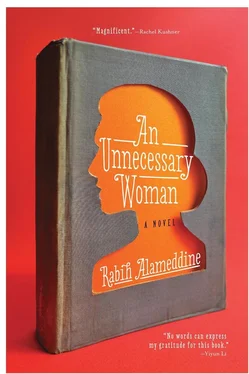All four of us look at one another. Fadia stands up in a huff as if the tripping of the circuit breaker is a personal affront, as if Beirut’s foibles and idiosyncrasies exist only to irritate her.
“I’ll switch it back on,” I say, moving forward in my chair to stand up.
“Don’t worry,” she says. “I know where the fuse box is.”
The apartment’s circuit breaker is only able to handle two hair dryers. Whenever Fadia tries to turn hers on, the breaker trips.
Joumana suggests that one of us can iron the pages dry, or to be more precise, run a hot iron over a towel covering the damp sheet of paper. I do have an iron and a board.
“I’m not ironing,” Fadia announces. “Blow-dry, yes; iron, no.”
Marie-Thérèse sits on the love seat, in the same position and in the same spot where Hannah used to sit all those years ago. That was where she sat. That was where she knitted a red-and-pink scarf for her nephew, a scarf she never saw him wear, which caused her no little irritation. That was where she listened to me read Beauvoir aloud. From that love seat, she shared her stories with me. Always prim, always proper, but her dresses never fit quite right, and the cardigans she loved rarely matched them. That was where she wrote in her journals. How many years did she sit there? I should be able to count the years. How many evenings? All I have now is her writing and my memory. Who will keep her journals when I am gone?
“I like this,” Marie-Thérèse says. She holds a page in front of her glasses. “You write well.”
“I didn’t write it,” I say. “It’s a translation.”
“Your handwriting is small,” Fadia says. “I can’t read a thing.”
“Eyeglasses,” Marie-Thérèse says.
Fadia is the only one of us who isn’t wearing glasses. I can’t recall her ever wearing a pair.
“Has anybody read these translations?” Joumana asks.
I don’t know what to tell her. No one has, of course. I see her hesitate; as tactful as she’s trying to be, her curiosity isn’t easy to mask. Fadia is as jumpy as a horse a few seconds before a race begins.
Joumana tries a different angle. “Have you considered publishing all this?”
“No,” I say.
The look on her face confuses me. I wait for her to say something or ask another question, but she doesn’t. She keeps looking at me, discomfiting me. Then she nods her head slightly, a small downward and forward jerk, and I understand. She wants me to continue.
“I’m not that good,” I say, “and I’m not sure anyone would be interested in reading my translations.”
“You’re not sure anyone is interested in reading Anna Karenina ?” Joumana asks.
This look, disbelief, I can decipher.
“Anna is one of my earliest. It has been translated into Arabic. I’m not sure mine would add anything, not sure if it’s of any significance at all. I created a system to pass the time. This is all a whim.”
“A whim?” Joumana shakes her head.
“A whim?” Marie-Thérèse asks.
“A whim.” Fadia smiles.
“A whim,” I insist.
Joumana looks at each crate on the floor; her eyes settle on one for a second or two before moving to the next. “Don’t you want people to read your writing?”
“My writing?” I have to say I’ve never thought of my projects as writing. “I’m translating. The writer is Tolstoy. It’s Sebald, not me.”
“Your work, then? Don’t you want your work to be read?” Joumana talks to me as I imagine she does to her students, patient and mentoring.
“I don’t know,” I say, which is as honest an answer as I can muster. I want her to understand, I want to understand.
“Don’t you wish to keep a record of everything you’ve translated?” Joumana asks, pointing to all the boxes. “These writers, I’ve never heard of them. Pessoa? Hamsun? Cortázar? Hedayat? Karasu? Nooteboom? Kertész?”
“Wonderful writers,” I say, “even a couple of Nobel Prize winners.”
“More to the point,” she says, “I’d like to read them. Others would as well.”
“You can read the English translations,” I say. “Wouldn’t that be better? The original translation can at times convey the subtleties of the writer’s language, its diction, its rhythm and rhyme. My version is a translation of a translation. All is doubly lost. My version is nothing.”
“I can have a few graduate students from the university transcribe all this.”
“Why would they want to do that?”
No one is working anymore. The blow dryers remain quiet, perhaps wanting to overhear the conversation.
“Because serfs do what I tell them to,” Joumana says. “I’m joking,” she adds when she notices that I don’t get the joke. “They’ll do it because it’s research. Library science students, or maybe from the Arabic department. It doesn’t matter. I’ll get them.”
“I’m not sure I’m ready,” I say.
“How long have you been doing this?” Fadia asks.
“Fifty years.”
“And you haven’t thought of changing your system in fifty years?”
I’m not sure I understand and I tell her so.
“You’ve been doing the same thing for fifty years, the same exact thing. Did you not once consider adjusting something?”
“I haven’t been doing the same thing. I translate a different book every year, different writers, from different parts of this world of ours. I make a point of taking on dissimilar kinds of novels. I like distinctive novels with an atypical voice. Every project has been unique. I think—”
“But have you not considered trying a new methodology?” she persists. “Changing tactics?”
“She’s explaining,” Marie-Thérèse tells Fadia. “Every project is different. Let her speak without interrupting.”
“It seems the same to me,” Fadia says.
“Let me translate what she’s saying,” Marie-Thérèse replies. “You change the color of your nails regularly, but you don’t vary how you put it on. You have a system, but you don’t use the same color.”
“I don’t have a system,” Fadia says. “I have a manicurist.”
“Don’t pretend you don’t know what I’m talking about,” says Marie-Thérèse.
“Look,” says Fadia. “I don’t have the same manicure every time. It’s not just the color I change. I change the brand, I change the kind. Sometimes I have a morning manicure, sometimes an evening one. Sometimes the manicurist comes to me, sometimes I go to her. Why, every now and then, I even change manicurists.”
“I should have a manicure, right?” I say.
“Oh Lord, yes,” Fadia says. “I’ll try to be gentle here. Yes, you need a manicure. I can’t think of anyone who needs one more, maybe Russian wrestlers or East German swimmers. Now, please don’t tell me you don’t care about how you look and that there’s more to you than your appearance. There are two kinds of people in this world: people who want to be desired, and people who want to be desired so much that they pretend they don’t.”
“I’m not sure that a manicure is going to make me desirable.”
We work all morning. I run the iron in one corner of my reading room. Fadia and Marie-Thérèse blow-dry. The three of us form a triangle, or three points on a circle, within which Joumana moves. She performs triage: she organizes the piles, decides what needs resuscitation first, which page for ironing and which for hot air.
I develop a system: press forward and backward twice, then lift the blue towel to check if the page is dry. Most times I have to go over it once more. Naturally, I don’t need to use the iron’s steam functions.
We settle into a silent routine. Fadia talks to herself, but no one can hear her above the din of the blow dryers. Marie-Thérèse concentrates on the task before her, but Fadia treats it as some kind of game. Joumana asks her to give each page more of her attention, and she does for a minute or so. Still, the weird sisters are coordinated. Yes, it’s as if they’ve been resuscitating manuscripts all their lives. Without realizing it, I begin to fall in with their cycle. I look up after finishing each page, making sure I can move on to the next.
Читать дальше












